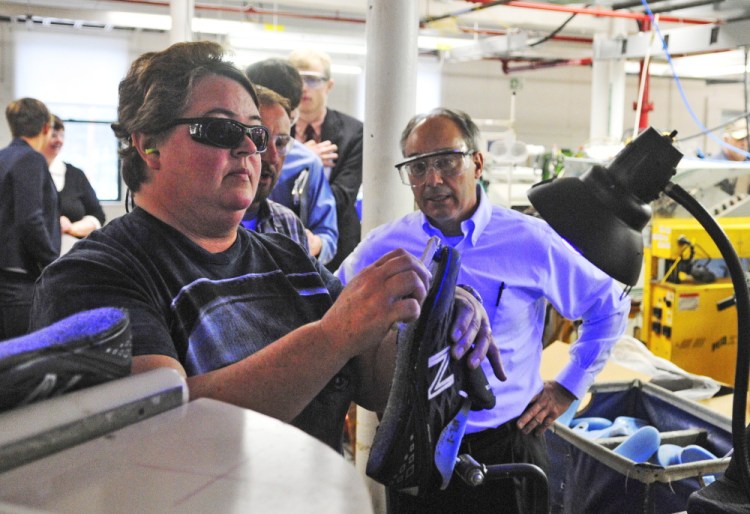Shoe manufacturer New Balance applauded an amendment to the National Defense Authorization Act championed by members of Maine’s congressional delegation that would force the Department of Defense to buy American-made athletic shoes.
The amendment – which would require the department to adhere to a 2014 policy closing a loophole that allowed it to issue cash vouchers rather than buy U.S.-made athletic shoes – was approved late Wednesday night by the House Armed Services Committee. The defense authorization act, which sets the budget and policy for the department, must be approved by the full House and Senate.
The amendment is a boost to New Balance, which employs 900 workers at factories in Skowhegan, Norridgewock and Norway and has developed a shoe that complies with Defense Department standards.
The amendment “is the strongest language we’ve seen to date that will actually force the Department of Defense to follow the law,” Matt LeBretton, vice president of public affairs at New Balance, said Thursday.
“This is a huge step forward for us,” he said. “We’re as close now as we’ve ever been to having our 900 people that work for us in Maine make shoes for the military.”
U.S. Rep. Bruce Poliquin issued a statement Thursday calling the amendment “a victory in the battle to grow and protect the 900 jobs in Skowhegan, Norridgewock and Norway where hard-working Mainers manufacture the highest-quality shoes in the world.”
“This is a win for the American taxpayer as well, because tax money should be spent with American workers and products, not foreign manufacturing, wherever possible,” Poliquin said.
Previous language in the act allowed the Department of Defense to bypass the Berry Amendment, which requires the military to buy uniforms, including shoes, from U.S. manufacturers. The department has said that no U.S.-made athletic shoes complied with the Berry requirements, including that all the elements used in making the shoe are U.S. products. In 2014, the Defense Department promised to start providing athletic shoes to military members as long as they met the guidelines, and in 2015 New Balance said it had developed a shoe that did.
Poliquin, a Republican representing Maine’s 2nd Congressional District, where all three of Massachusetts-based New Balance’s Maine factories are located, worked with Massachusetts Rep. Niki Tsongas on changing the legislation and co-sponsored the Stepping Up for American Workers and Troops Act, which requires the Department of Defense to follow the 2014 shoe policy. Democratic Rep. Chellie Pingree, of Maine’s 1st District, co-sponsored the measure.
A spokesman for Poliquin’s office said Thursday that the language in the amendment to the defense budget is identical to the bill and is “very likely” to be approved by the House, probably next month.
Maine’s senators, Republican Susan Collins and independent Angus King, also have been working on the issue. They introduced a companion bill last week that would require the Department of Defense to provide military recruits with American-made athletic shoes upon arrival at basic training.
Maine’s congressional delegation increasingly has pressured the Defense Department to adhere to the 2014 promise, with Collins and King introducing legislation in 2013 to encourage compliance with the Berry Amendment.
During an Appropriations Committee hearing on the defense budget Wednesday, Collins chided Secretary of Defense Ashton Carter for the department’s continued failure to keep the 2014 promise.
LeBretton said the Defense Department’s stance has hurt New Balance.
“Based on the department’s own policy change from two years ago, we projected we would have a certain number of pairs being made in the factories that aren’t being made. So that certainly is not a good thing,” he said.
On Thursday, state Rep. Jeff McCabe, D-Skowhegan, applauded the proposed defense act change.
“This bipartisan effort is a win for New Balance workers in Skowhegan, Norridgewock and Norway,” McCabe said. “For too long, New Balance workers have been waiting for the military to fulfill its promise to our manufacturers.”
Poliquin’s statement said that by issuing the vouchers rather than buying U.S.-made athletic shoes for military recruits, the Defense Department has spent about $180 million elsewhere. These are “critical funds that could have gone to American jobs and manufacturing,” he said.
Send questions/comments to the editors.


